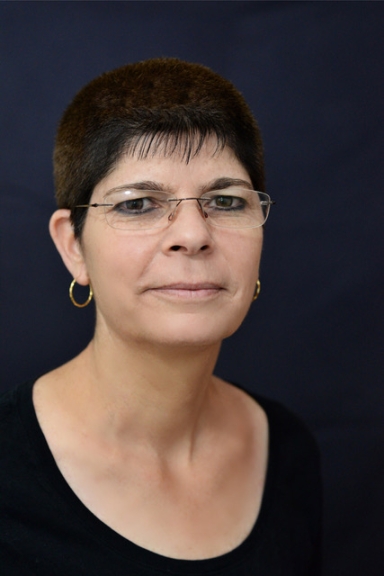Michal Strier
Visiting Assistant Professor of Hebrew

- Office
- Axinn 310
- mstrier@middlebury.edu
- Office Hours
- By appointment.
Michal Strier holds a Ph.D. in Political Socialization, Social Capital, and Trust; an M.A. in NGO Management and in Public Policy and Administration—both from the Guilford Glazer Faculty of Business and Management at Ben-Gurion University of the Negev, Beer-Sheva; a B.Ed. in Non-Formal Education and Educational Activity in the Community from Beit Berl College, Kfar-Saba; and an Arts teaching diploma from Kaye Academic College of Education, Beer-Sheva.
Michal led the establishment of the Democratic School of Arad and subsequently managed it for eight years, during which she taught a variety of subjects to students across a wide age range, using Democratic Education pedagogy and methods. In addition, she organized and taught training workshops for groups initiating alternative schools and frameworks. She also initiated, organized, and headed conferences for the entire democratic education arena in Israel.
In 2018, Michal joined the Middlebury Language Schools – The School of Hebrew, where she taught Modern Hebrew. She teaches Research Methods in the M.A. and DML programs and serves as a dissertation adviser for doctoral students in the DML program.
At Middlebury, during the academic year, Michal teaches Modern Hebrew courses and a course on Social Capital, Social Networks, and Trust.
As a researcher, her primary interests center on Social Capital, with a focus on Trust and its influence on democracy, civil society, and education.
Courses Taught
HEBM 0101
Introduction Modern Hebrew I
Course Description
Introductory Modern Hebrew I
In this course students will become acquainted with the basic grammatical and formal concepts necessary for the comprehension of the Modern Hebrew language. We will focus on the fundamentals of reading, writing, listening, and speaking, with a particular emphasis placed on the acquisition of conversational ability. We will also make use of audiovisual, situational, and cultural exercises, and give attention to the elements of Classical form and style that provided a foundation for Modern Hebrew, which was revived as a vernacular in the late 19th century. No previous knowledge of Hebrew is required. 6 hrs.
Terms Taught
Requirements
HEBM 0102
Intro Modern Hebrew II
Course Description
Introductory Modern Hebrew II
This course is an intensive continuation of Modern Hebrew 0101. Students will expand their knowledge of Hebrew grammar and vocabulary, will increase their proficiency in oral communication, and will study selections of both audio and visual media related to modern-day Israel. (HEBM 0101 or by permission) 10 hrs. lect.
Terms Taught
Requirements
HEBM 0103
Current
Intro Modern Hebrew III
Course Description
Introductory Modern Hebrew III: Modern Hebrew Through Culture
Explore the acquisition of Modern Hebrew through cultural immersion. This course, a continuation of Modern Hebrew 0102, introduces students to Hebrew vocabulary and grammar while examining cultural elements such as rituals, religion, social milestones, and cultural symbols. Students will engage in comparative discussions between Israeli and American cultures, fostering a deeper understanding of the language within its cultural context, and developing communication skills in Hebrew. (HEBM 0102 or equivalent) 5 hrs. lect.
Terms Taught
Requirements
HEBM 0201
Intermediate Modern Hebrew I
Course Description
Intermediate Modern Hebrew I
This course is a continuation of HEBM 0103. By engaging with topics about Israeli society and culture and by using authentic materials and different media, students will strengthen their intermediate level of communicative competence – reading, writing, listening, and speaking – and gain a deeper understanding of Israeli popular culture and politics. Topics will vary depending on students’ interest. (HEBM 0103 or placement test) 5 hrs. lect/disc
Terms Taught
Requirements
HEBM 0202
Intermediate Modern Hebrew II
Course Description
Intermediate Modern Hebrew II
This is the fifth in the sequence of Modern Hebrew courses that focus on the acquisition of reading, listening, writing, and speaking skills. This course will further increase the students' fluency in spoken Hebrew, as well as their facility in reading authentic texts dealing with both secular and religious Jewish cultures, the literature of modern-day Israel, Israeli history, and current events. By the end of the semester, students should attain the level of educated, non-native speakers of Modern Hebrew, in terms of knowledge of grammar, vocabulary, composition, and communicative competence. (HEBM 0201 or equivalent) 5 hrs. lect/disc.
Terms Taught
Requirements
HEBM 0500
Current
Upcoming
Independent Project
Course Description
Independent Project
(Approval Required)
Terms Taught
INTD 0140
Current
Social Capital Networks &Trust
Course Description
Social Capital, Social Networks and Trust: In Israel and in the United States
This course will introduce students to Social Capital, and the components that go along with it: Social Networks, Trust, and Social Norms. Additionally, we will discuss the role of social capital in various substantive areas including Democracy, Civic Engagement, Community, Education, Economy. Based on academic literature, videos and lectures we will explore various perspectives, manifestations and effects of Social Capital, mainly in Israel and in the US. The ultimate aim is to enable students to understand the theoretical definitions, conceptualizations, and typologies of social capital and its components, and how to relate theory to the real world by learning to use the practical side of it and to develop and use it according to needs of individuals, communities, and organizations.
Terms Taught
Requirements
